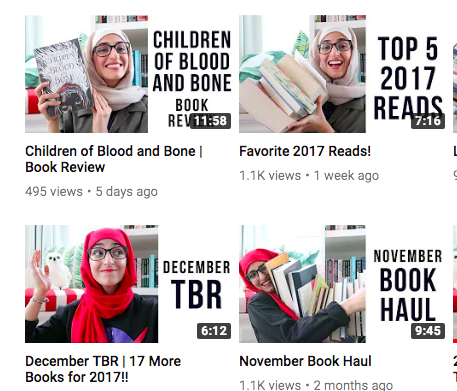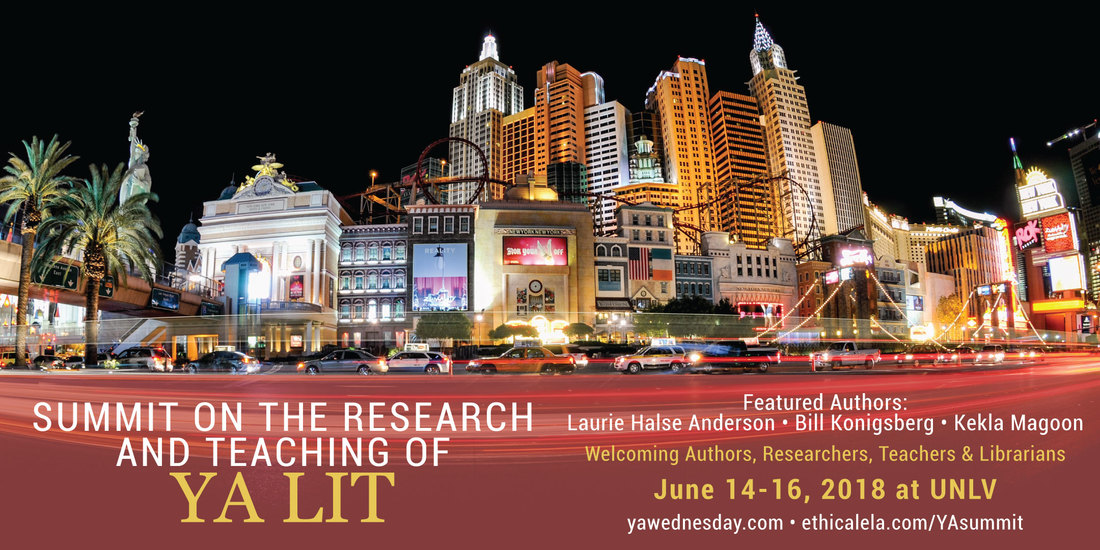* Drop to the bottom to find out more information about the 2018 Summit on the Research and Teaching of YA Literature to be held at UNLV.
Channeling Young Adult Literature: The Wonderful World of BookTube by Tara Anderson and Emily Wender
BookTube does not exist in a formal space on the YouTube social network, but rather in the connections between avid readers who love to talk about books. The easiest way to discover this corner of the internet is simply to search YouTube for a favorite book or genre. Did you love The Hate U Give by Angie Thomas? Then you’ll definitely want to check out mynameismarines’ in-depth review of the novel. Love fantasy? Regan at PeruseProject has a video sharing an epic list of her favorite novels and series in the genre. To get you started with BookTube, we’ve linked both videos below!
Mynameismarines' review of The Hate U Give
Regan at PeruseProject
For those of us who love YA Lit, we could easily be sucked into this world of book hauls and monthly reading wrap-ups. But what value does BookTube hold for us as teachers and teacher educators? BookTube can give us a window into the books that young people are reading and talking about. As educators, so much of our knowledge about YA literature comes from other adults and other education professionals. We learn about good books, and we recommend those to our students. But BookTube flips this model and gives us the opportunity to learn from young people who love books just as much (or maybe more!) than we do. Taking time to watch BookTube videos can be another tool to help build knowledge of great books that we can recommend to students or purchase for classroom libraries.
Many of the videos on BookTube are reviews of novels. In addition to whetting students’ appetites for books with booktalks, teachers and librarians can share video reviews (spoiler free, of course) with students to introduce them to new books. Moreover, teachers can give students the option of creating BookTube-style video reviews as part of a novel unit, literature circle, or independent reading project. Crafting a video review can employ a combination of traditional literacy skills and new literacies skills, including persuasive writing, storyboarding, and video editing.
Ariel Bissett's review
sarawithoutanH
| In its focus on goals and its celebrations of books read, Booktubers model self-sponsored reading and reading communities. Video reviews also offer students diverse examples of what self-sponsored reading can look like. For those of us interested in YAL, these videos go beyond illuminating a reading habit or a commitment to the genre, although they do that in spades: these videos also show how reading YAL and vlogging about it can connect you to other readers. There is a whole world out there, and in each video, you get a snippet of the interactions about YAL that are building that world. Take, for example, Farah Shamma’s booktube channel, which she describes as, “Diverse Booktube! A Muslim Arab book-lover and aspiring writer from the UAE talking about books and my writing journey!” |
As readers with extensive experiences with YAL who both offer and respond to celebration and critique of novels, Booktubers have created their own hub of insight and commentary. They are informed and passionate readers whose videos can show how literary and discourse analysis can feel important, relevant, and accessible to our students and to us.
Look, for example, at Adriana’s critical commentary titled “How We Talk about Diversity and Queer Lit” on their amazing Booktube channel “perpetualpages.”
Today I’m very scared to make this video because I know what I’m going to talk about means a lot to me and I’m terrified of getting it wrong, but I think I’m more terrified of staying silent. What I’m going to be talking about today is reading diversity or queer lit, and neither one of these topics are easy, neither one of these topics are simple, and I’m human.
They explain the exigence for their video, a recent vlogging event in the Booktube community: Top 5 Wednesday. The most recent Top 5 Wednesday, they explain, asked for Top 5 Favorite Diverse Characters, but unlike most Wednesdays, far fewer people posted. As Adriana begins, “I was disappointed by what I didn’t see.”
In her young adult literature course, Emily uses Booktube videos, such as this one by Adriana, to provide new appreciative or critical perspectives about a particular novel or a facet of YAL and its community of readers. For Emily’s students, Booktube videos can provide a window to online discussions that connect to the scholarship they are encountering in class and the discussions they are having amongst themselves. And Booktube demonstrates the many different ways readers (even academic ones) can approach YAL: with celebration, critique, concern, connection, laughter, desire, questions, etc.
Getting Started
- Francina Simone for critical perspectives on reading and writing YA
- Thoughts on Tomes for short, informative reviews of fantasy and contemporary novels
- TheBookTuber for creative videos on bookish themes
- Taylortalksbooks for contemporary and romance recommendations
- ChapterStackss for reviews on great thrillers and horror novels
- InsaneReader for laugh-out-loud recommendation lists
And, if you or your students are feeling extra adventurous, why not start a channel? Here are some videos to get you started:
- “How to Start a BookTube Channel” and “How to Improve Your Book Reviews” by emmmabooks“Advice for New BookTubers” and “Tips for New BookTubers by BookTubers” by readbyzoe
- “How to BookTube” by Little Book Owl
- “How to Start a BookTube Channel” playlist (6 videos) by readsanddaydreams
Tara Anderson Gold is a former middle school teacher/librarian, and current doctoral candidate at the University of North Carolina at Chapel Hill School of Education. Her research centers on the intersection of adolescent literature and new media practices, and she is currently writing her dissertation on the wonderful world of BookTube. She can be reached at: [email protected]
Come be #VegasStrong and YA Critical
The research outlets for YA Studies will be discussed including the vast array of literacy journals, but with a specific look at the journals in our field. What has been published in The ALAN Review, The Signal Journal, and in Study and Scrutiny? How have the various Children Literature journals attended to Young Adult Literature?
We just sent out proposal acceptances to different academics, teachers, and graduate students. Look forward to further announcements about who will be presenting and the topics that will connect to the questions above. In addition many topics will be of specific value to classroom teachers and school media specialists. Topics will include: "reluctant" readers, combining writing and reading, bibliotherapy, censorship, diverse text, bridging to the classics with YA etc.
Until next week.



 RSS Feed
RSS Feed